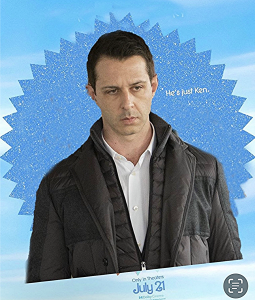
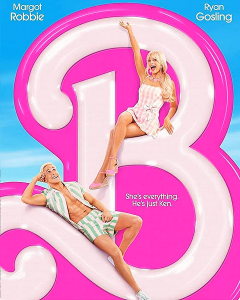
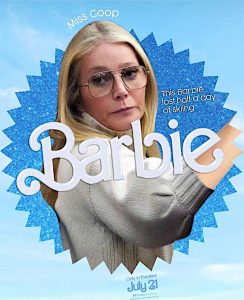
An April opening doesn’t necessarily mean what it used to mean — i.e., an interesting, fairly good film that doesn’t quite make it by Ivy League standards.
The word has already gotten out that Ari Aster‘s three-hour Beau Is Afraid (A24, 4.14) is a grueling, agonizing sit, and that it will probably take weeks of therapy to clean the residue out of the average person’s head.
Ben Affleck‘s Air, on the other hand, certainly makes it if you’re willing to think modestly or in “dad movie” terms, and if you don’t insist on a grand-slam experience.
Either way there’s nothing problematic about an April opening per se. There is, however, something to possibly be feared if your film opens in the mid to late fall, and it becomes a favored Best Picture contender.
Friendo explains: “As we’ve been learning over the last five years or so, there is much less value in the Oscar race today…contaminated by woke critics and their myopic, anti-populist priorities, the Oscar brand is so bad that smart producers aren’t necessarily aiming for an Oscar association…it used to be that Oscar-buzz movies made money or at least enjoyed a certain elevated status…now it’s almost the opposite.”
Oscar movies have become about eating your woke vegetables and applauding the raising of our shared social consciousness…[and] fewer people are interested in them, because of the woke thing or whatever. Or because Millennials and Zoomers have become totally alienated from the brand. Or because Best Picture property values have gone underwater in the wake of Everything Everywhere All At Once winning all those trophies few weeks ago. The brand has been totally poisoned, or at least miniaturized.

HE: London in November can sometimes be on the mild side, but it’s certainly not T-shirt weather…try again! At the very least it’s jacket weather. Oh, and November leaves have turned orange, yellow and brown and are generally on the ground…try again.
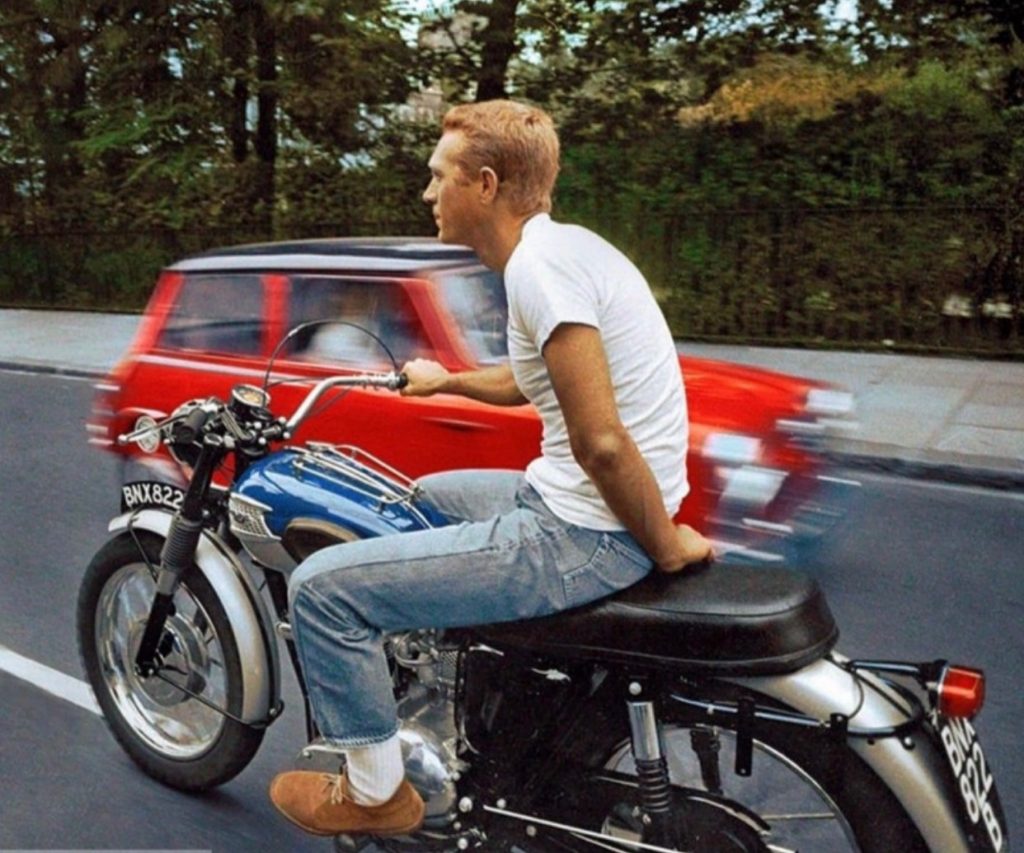
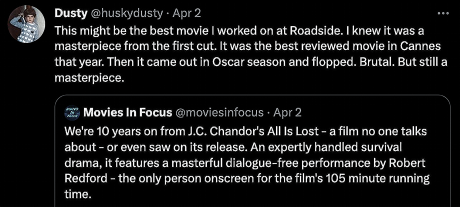
It’s been over a decade, and still the question lingers — what the hell happened, award-season-wise, to J.C. Chandor‘s All Is Lost and particularly to Robert Redford‘s towering performance in that film?
After a stellar and industrious career of 50-plus years Redford had given the finest performance of his career, a performance that seems all the more skillful and affecting because of its deftness and spareness and near-silence. And yet he was blown off by SAG colleagues and Academy members because…okay, because he didn’t campaign that much (certainly not to the extent that Bruce Dern did) but mainly because those wankers couldn’t be bothered to watch All Is Lost.
Why? Because they’re lazy but also, I suspect, because they didn’t want to see a film about a resourceful old guy struggling to survive against nature’s merciless persistence. Nature will get us all sooner or later, and they didn’t to grapple with that — too close to the bone.
In late ’13 a journalist friend told me about speaking to a very well-known actor at a party. He said the actor had told him he’d popped in a screener of All Is Lost and then turned it off after ten minutes or so. The actor’s explanation went something along the lines of ‘I saw what this was going to be…all alone, no dialogue, the threat of death…and I quit.’ Advanced-age ADD is what home screenings are all about. This is why All Is Lost has to be seen in a theatre, why it has to be paid close attention to.
Jonathan Goldstein and John Francis Daley‘s Dungeons & Dragons is instantly boring and a waste of time. I was rolling my eyes after ten minutes’ worth, and I bailed altogether after a half-hour or so. The writing is trite and formulaic. The mood is spritzy and light-hearted, yes, but in a strange way exhausting. It’s the kind of material that we’ve seen over and over, and if you’re happy with this kind of shite I don’t know what to tell you. Chris Pine, Michelle Rodriguez, Regé-Jean Page, Justice Smith, Sophia Lillis and Hugh Grant sleep-walk through it.
Yesterday afternoon I hate-watched Zach Braff and Florence Pugh‘s A Good Person (MGM, 3.24). It’s basically a Lifetime movie about (a) slow grief recovery, (b) Oxycontin addiction and (c) the patient counsel of Morgan Freeman.
After 15 or 20 minutes I wanted to pop an Oxy myself, and maybe another half for good measure.
It’s arduous to sit through — instructive, over-acted, schmaltzy, precious, on the nose, emotionally insistent, socially curious and fortified with phony writing.
I hate addiction, AA and grief-recovery movies, and I really hated the acting in this film in particular. Bored shitless, I mean.
Pugh will always be a grounded, real-deal actress, but the screenplay’s flat treatment of Oxy addiction is “okay, okay, I’ve had enough, what else can you show me?” Freeman has always been excellent in whatever role, but you can tell he’s struggling or, you know, doing the best he can under duress. His vibe feels saggy, weary. Plus Freeman is around 85 now and seems too old to be the dad of Chinaza Uchi, who plays Pugh’s 30ish ex-fiance. He’s more like a grandfather type.
The only reason A Good Person managed a 55% Rotten Tomatoes and a 50% Metacitic grade is because a good portion of the ensemble cast is Black. If the cast had been all-Anglo, it would have fared much worse.
There’s a scene in which Freeman, the father of Pugh’s ex-fiance, shows Pugh an elaborate train set within a model of a miniature town in his basement, and I was saying to myself “this is half-working, this scene…they’ve finally found a groove.” And then Pugh’s character starts singing “Last Train to Clarksville” and Freeman joins in…the fucking Monkees!
I’m sorry but I have to say this: What extended family or close-knit social circle (i.e., people who routinely get together for holidays and birthdays) is composed of 55% POCs and 45% Anglos? Or vice versa? Even in super-artsy or super-wealthy X-factor circles, this kind of social bonding is…well, I’m not aware that it’s common. A Good Person is set in northern New Jersey near West Orange (i.e., Jett and Cait’s neighborhood) and I know how things look and feel in that neck of the woods. Good people and middle-class vibes, but not as woke as Braff and Pugh (who co-produced and collaborated on the script) are imagining.
I hated Mauro Fiore‘s muted, blue-ish cinematography.
Obviously the 11.22.23 theatrical debut of Ridley Scott‘s Napoleon (Apple/Sony) and the 11.22.63 assassination of John F. Kennedy haven’t the slightest echo element, and yet 11.22.23 will mark that 60th anniversary. No biggie, just saying.
It was roughly a month ago that former HE commenter Jeremy Fassler, one of the most belligerent and condemning one-note wokesters to ever leave his mark on Hollywood Elsewhere, was given his walking papers.
And yet he used to be a much different person. 18 years ago, I mean, when Fassler was in ninth or tenth grade. I came across a 2.23.15 post about Sideways, written by a 15 year-old Fassler.
“I’m 15, and I saw Sideways before it opened and loved it every bit as much as you did,” he wrote. “But I only have two friends who are around my age who liked it as much as I did.
“Everyone else I’ve talked to has not had a positive reaction to the movie. ‘I didn’t understand why [Paul Giamatti and Thomas Hayden Church] were friends,’ one said. I told another to watch it again in a few years and he said, ‘If I don’t like it now why would I ever like it?’ Even some adults, like my substitute teacher in English, thought that it was so unlikable and couldn’t muster up any sympathy for Giamatti’s character.
“I figured you’d be the best guy to ask. Why don’t more people of my age understand Sideways?” — Jeremy Fassler.
Wells to Fassler [also written in early ’05]: “I haven’t a clue as to why your English teacher found it unlikable, but he probably needs to get out more. That or Giamatti’s character reminded him of something in himself on some level, and he didn’t like thinking about that. Your friends not liking it is probably about life-experience issues. My 16 year-old son Jett says ‘several’ of his friends liked it fine.”
Presumably a sizable portion of the HE community caught those ticket-buyer sneaks of Ben Affleck‘s Air last…what was it, Friday?
The non-pro consensus seems to be that (a) early-bird critics have over-sold it (but not me — I gave it a solid 8.5 grade while adding “just don’t go expecting the world”), (b) it was a bit of an odd strategy for Michael Jordan to technically be “present” for the third-act presentation scene at Nike’s Beaverton headquarters without actually being seen or heard and letting Viola Davis do all the talking, (c) the decision not to try and inflate or amplify the story into something bigger than it is was a wise one.
So what did everyone think? Is it modestly excellent or what? Is it basically a “dad” film or will Millennials and Zoomers be able to roll with it?
Posted from Metro North train after seeing Air, 3.22, 10:30 pm:
Ben Affleck’s Air is a solid 8.5 or even a 9 —- just don’t go expecting the world. It’s a modest, well-crafted film about vision and risk and soul and salesmanship, and the best aspect, I feel, is that it doesn’t swing for the fences.
It’s an unpretentious, steady-as-she-goes sports saga that frets about stress and failure and at the same time insists over and over that “if you don’t take a risk you can’t make a gain,” which is precisely what Walter Huston’s chuckling, goat-like prospector said in The Treasure of the Sierra Madre.
In a way Air is just as much of a pikers-strike-it-rich story as John Huston’s 1948 classic was and is, and the stakes are just as life-and-death when you consider what might’ve happened if Nike hadn’t signed Michael Jordan and if Matt Damon’s Sonny Vaccaro and Affleck’s Phil Knight had taken a gut punch instead.
Their down-to-business story is about marketing and branding that wound up on a super-scale, but told with a modest brush. Nothing goofy or slick or wild-ass. It starts out ordinarily or even ho-hummishly, but then it picks up a little steam and then a little more, and then little dabs of feeling are sprinkled into the second act and then spoonfuls of the stuff into the third as it gets better and better and better.
And then the big payoff moment comes, which isn’t as emotional as Jerry Maguire but then how could it be? Air isn’t about wives or girlfriends or kids or dogs…it’s strictly about business and that’s a good enough thing, trust me.
Here’s the thing: Damon’s Vaccaro is a beefalo bordering on a lardbucket, and I was bothered by this at first. But guess what? I stopped thinking about the paunch around the 30-minute mark. By the one-hour mark I’d forgotten about it entirely. This in itself says a lot.
7:55 am update: It’s being said that Viola Davis’s grounded performance as Michael Jordan’s tough negotiating mom, Deloris, is the keeper. She’ll probably be Oscar-nominated, but Damon’s Vaccaro shoulders the weight. He’s playing the poet and the singer and the believer of the piece, and it’s his best performance since…what, the second Bourne film? Or The Informant? And I love how he’s never cowed by Affleck’s Knight, calmly standing his ground, and in fact plays him at the very end. It’s brilliant. And I love Chris Messina’s tough-shithead agent who reps the Jordans and is content to eat alone.
…from a film of this sort are stabs at semi–fresh invention — departures from the usual formula, a surprise or two, unexpected gravitas and a film that basically says “this is a franchise thing, okay, but it’s also 2023 and here we all are, and there’s something about this immediacy that really and truly matters to many of us, and here’s a taste of that.”
Spare us, in short, from the past and the drumbeat of constant Spielberg-Lucas tributes.

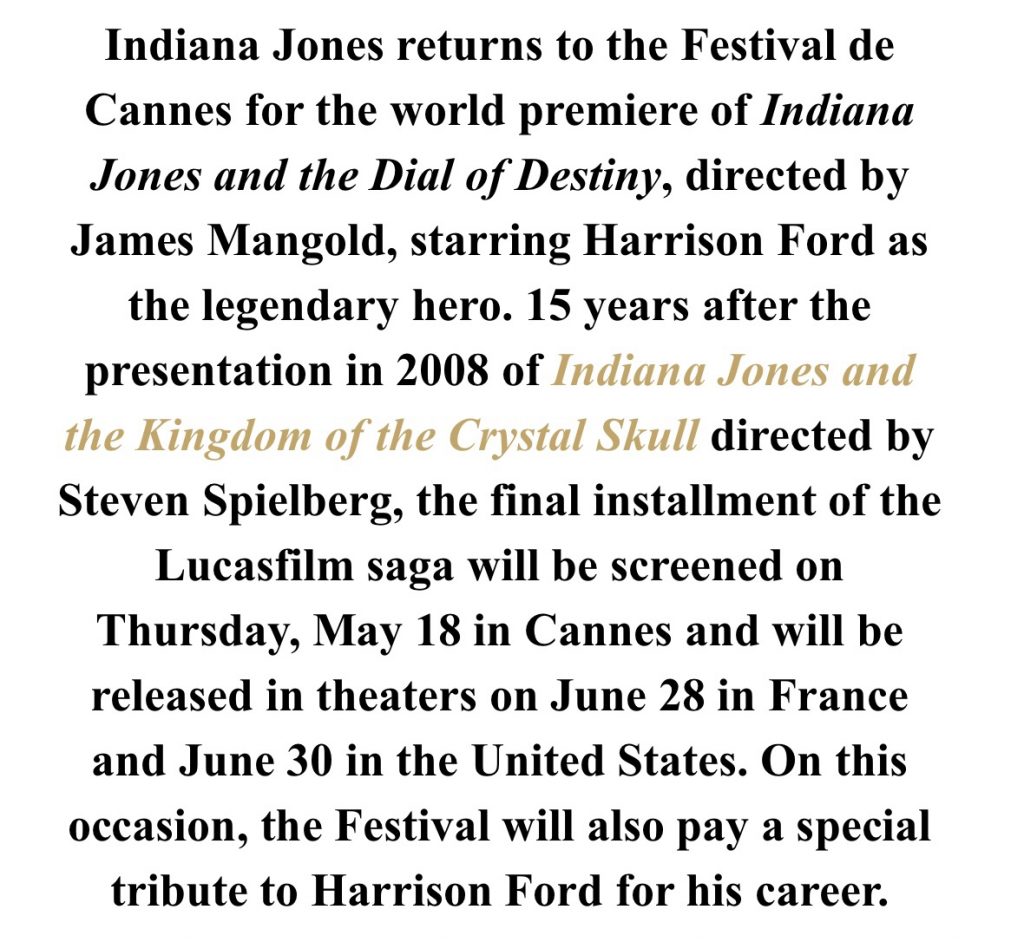
HE to Correcting Jeff [posted this morning in “Don’t Lecture Me” comment thread]:
I’ve read and read every day of my life, although to be honest I’m better at reading chapters or portions or halves than entire books. Life often distracts, intervenes. Each and every day I drop a ball, it seems, and fail to catch it on the bounce.
HE’s library list includes John Updike, Don DeLillo, Joan Didion, Cormac McCarthy, Truman Capote, Harper Lee, William Styron, Pauline Kael, Daphne du Maurier, Michael Chabon, Chuck Palahniuk, Robert M. Pursig, Michael Herr, Gore Vidal, the collected essays of Otis Ferguson, damn near all of J.D.Salinger, Joseph Heller, Kurt Vonnegut, Joseph Conrad, et. al., and some of John Steinbeck.
.
I’ve read D.H. Lawrence, Henry Miller’s “Tropic of Cancer,” Herman Hesse, Aldous Huxley, Woody Allen’s short stories, Robert Benchley’s stuff, rock legend bios, endless Hollywood histories (David Thomson’s “The Whole Equation”). And occasional throwaway stuff (“The Nine Nations of North America,” Abbie Hoffman’s “Revolution For The Hell Of It”).
I’ve never read “A Tale of Two Cities” but I’ve read “Tom Sawyer” and the Bhagavad Gita (repeatedly) and one or two books by Alan Watts and “The Red Badge of Courage” and “The Final Days” and almost all of Norman Mailer, Tom Wolfe and Hunter S. Thompson.
Why am I taking the time to make the case for my own literacy to a coarse, badgering asshat on a comment thread?
Honest, no–bullshit question: Have you ever read Nick Tosches’ “Dino: Living High in the Dirty Business of Dreams”? I’ve read that book cover to cover TWICE.
“It’s funny to hear these [mewing little kittens] treating the John Wick flicks like they’re major narrative-driven movies capable of being ‘spoiled.’ I like the new Wick, but neither Wells nor the spoiler whiners seem to understand that a plot doesn’t matter to these movies at all, and [that] notions of death matter even less.” — HE commenter “Chuck.”
“Isn’t the ending of John Wick 4 all over the internet? I haven’t seen the film, haven’t read a single review, have no interest in the Wick films. But I know that Wick dies or probably ‘dies’ at the end of this one. Seems to be an open secret on the web, so calling spoiler in this case sounds a bit like complaining about people talking about Jesus being crucified at the end of a new Jesus movie.” — HE commenter “Renaissance.”
“I wouid have never mentioned the Darth Vader-Luke Skywalker blood relationship two weekends after opening day. That film is sacred and holy, and it would’ve been criminal to spoil it.
“The difference is clear. JW4 is flotsam — a rank and cynical pornoviolent ‘musical’ that pollutes the environment and lowers the spiritual property values in each and every realm with its gross and cynical disregard for life. I spit on this movie.
“I respected the rights of unpolluted viewers for TWO FULL WEEKENDS. What was I supposed to do, wait six months or something? Besides, like I said, it was really Stahelski’s fault.” — Jeffrey Wells, posted this morning [4.3] in response to spoiler whiner kvetching.